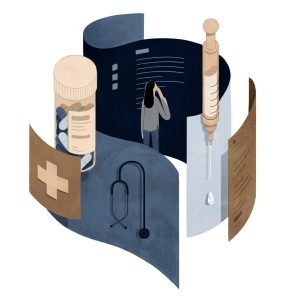By: Shiva Nourpanah and Kerri Neil

Shiva Nourpanah
Shiva Nourpanah is a SSHRC Post-Doctoral Fellow at the Centre for the Study of Social and Legal Responses to Violence, University of Guelph. She is also Adjunct Faculty at the Department of International Development Studies, Saint Mary’s University and School of Occupational Therapy, Dalhousie University. Her areas of research include immigration, with focus on refugees and temporary migrants. Her recent publications relevant to OTM are: “Maybe We Shouldn’t Laugh So Loud”: The Hostility and Welcome Experienced by Foreign Nurses on Temporary Work Permits in Nova Scotia, Canada, and Drive-by education: the role of vocational courses in the migration projects of foreign nurses in Canada.
How does temporary and precarious migration status affect the experience of the pandemic? Shiva Nourpanah’s OTM research shows how the labour and livelihood experiences of migrant nurses and other healthcare workers on temporary work permits are deeply shaped by their precarious migration status (CBC Ideas, 2019; Jackson et al., 2019; Leiter et al., 2018; Nourpanah, 2019a, 2019b; Nourpanah et al., 2018). The current pandemic is exacerbating such impacts (Scott, 2020).
As each day of the pandemic passes, we are becoming increasingly  aware of the extreme vulnerability and the danger facing one particular group: seniors and residents of long-term care facilities. We are seeing daily reports of facilities around the country affected by the pandemic and are hearing from residents and their families on their experiences (Canadian Press, 2020; Fitzpatrick, 2020). We are also hearing about the high risk of infection with Covid-19 among healthcare workers and the mental health effects of not only this risk but also dealing with the pandemic effects on their patients, clients and families (Mortillaro, 2020; Samuel, 2020; Sandoiu, 2020). We also know that a high proportion of staff in such facilities are migrant workers and trained nurses on temporary work permits. How is this temporary status interacting with uncertainty, volatility and heightened demands and visibility to affect their experience of the pandemic?
aware of the extreme vulnerability and the danger facing one particular group: seniors and residents of long-term care facilities. We are seeing daily reports of facilities around the country affected by the pandemic and are hearing from residents and their families on their experiences (Canadian Press, 2020; Fitzpatrick, 2020). We are also hearing about the high risk of infection with Covid-19 among healthcare workers and the mental health effects of not only this risk but also dealing with the pandemic effects on their patients, clients and families (Mortillaro, 2020; Samuel, 2020; Sandoiu, 2020). We also know that a high proportion of staff in such facilities are migrant workers and trained nurses on temporary work permits. How is this temporary status interacting with uncertainty, volatility and heightened demands and visibility to affect their experience of the pandemic?
Early thoughts and opinions from frontline nurses suggest that the impact is complex and will have both short-term consequences as well as more long-lasting effects. On the one hand, healthcare workers on temporary permits are worried that due to guidelines on self-isolation they will have less shifts, which in turn will adversely affect their visa requirements regarding the number of hours they need to work. On the other hand, picking up more shifts increases their exposure and heightens their risk of contracting the virus. Many international health care workers live with roommates, often from the same workplace. Many others share drives to work and back, a practice which has now effectively stopped, leaving car-less workers reliant on public transit, another source of uncertainty and risk. Of course, routes and capacity have also been cut back on public transit, further aggravating work- and mobility-related concerns for workers who rely on it to get to their clients and workplaces.
In the long-term, immigration plans, including sponsorships, family reunification and marriages have all been suspended. The mental and emotional toll of this stressor, in situations where reuniting with family and attaining stability is a primary aspiration for many of these temporary workers, is incalculable.
In sum, even in these early days it is becoming increasingly clear that for temporary residents who are conducting essential work for Canada, the impact of the pandemic is exacerbated by their temporary status. Some of these impacts may be inevitable, but some others may be alleviated with proper research and policy-making.
References
Canadian Press. 2020. “COVID-19 Detected in Long-Term Care Workers at Three Nova Scotia Residences.” The Star, March 29.
CBC Ideas. 2019. “On the Move: Commuting, Work, Life.” CBC. Retrieved October 16, 2019 (https://www.cbc.ca/radio/ideas/on-the-move-commuting-work-life-1.5035658).
Jackson, Lois, Sheri Price, Pauline Gardiner Barber, Audrey Kruisselbrink, Michael Leiter, Shiva Nourpanah, and Ivy Bourgeault. 2019. “Healthcare Workers ‘on the Move’: Making Visible the Employment-Related Geographic Mobility of Healthcare Workers.” Health Sociology Review 28(3):277–90.
Leiter, Michael P., Lois Jackson, Ivy Bourgeault, Sheri Price, Audrey Kruisselbrink, Pauline Gardiner Barber, and Shiva Nourpanah. 2018. “The Relationship of Safety with Burnout for Mobile Health Employees.” International Journal of Environmental Research and Public Health 15(7):1461.
Fitzpatrick, Meagan. 2020. “Long-Term Care Homes Are Worrisome COVID-19 Hotspots.” CBC, April 1.
Mortillaro, Nicole. 2020. “‘I’ve Never Been so Stressed’: Health-Care Workers in COVID-19 Battle Face PTSD, Mental Health Issues.” CBC, March 25.
Nourpanah, Shiva. 2019a. “Drive-By Education: The Role of Vocational Courses in the Migration Projects of Foreign Nurses in Canada.” Journal of International Migration and Integration 1–12.
Nourpanah, Shiva. 2019b. “‘Maybe We Shouldn’t Laugh So Loud’: The Hostility and Welcome Experienced by Foreign Nurses on Temporary Work Permits in Nova Scotia, Canada.” Labour / Le Travail 29(83):105–20.
Nourpanah, Shiva, Ivy Bourgeault, Lois Jackson, Sheri Price, Pauline Gardiner Barber, and Michael P. Leiter. 2018. “Intersecting Policy Contexts of Employment-Related Geographical Mobility of Healthcare Workers: The Case of Nova Scotia, Canada.” Healthcare Policy = Politiques De Sante 14(2):12–21.
Samuel, Sigal. 2020. “Doctors and Nurses Are Risking Their Mental Health for Us.” Vox. Retrieved April 1, 2020 (https://www.vox.com/future-perfect/2020/3/26/21193122/coronavirus-mental-health-doctors-nurses-covid-19).
Sandoiu, Ana. 2020. “COVID-19 Frontline Healthcare Workers at Risk of Poor Mental Health.” Medical News Today. Retrieved April 1, 2020 (https://www.medicalnewstoday.com/articles/covid-19-frontline-healthcare-workers-at-risk-of-mental-health-problems).
Scott, Katherine. 2020. “Long Term Care: Fatally Flawed System Demands Fundamental Change.” Behind the Numbers. Retrieved April 1, 2020 (http://behindthenumbers.ca/2020/03/30/long-term-care-fatally-flawed-system-demands-fundamental-change/).
Photo by Maggie Chiang. “Health Care in America | Commonwealth Fund.” CC BY-NC-ND 4.0 https://www.behance.net/gallery/71548275/Health-Care-in-America-Commonwealth-Fund


Leave a Reply